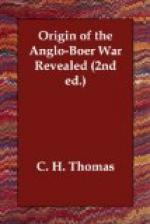It was, however, not President Krueger alone who had to decide—it affected the Bond as a whole. The diplomatic contest so far proved just the thing to ripen conditions for the meditated Bond coup d’etat. An alternative offer of a seven years’ franchise was interposed as a mere ruse. Never for a moment did the Afrikaner Bond leaders waver or quail in the face of resolute firmness, display of force, or even of moral pressure and notes of advice from imposing quarters, as Mr. Chamberlain had at first still fondly hoped. To the Bond it had all resolved itself to a mere question of time, of choosing the most opportune moment when to assume the aggressive. British attitude had only hastened the issue. Mr. Jan Hofmeyer had indeed been sent for from the Cape so as to assure that section of the Bond of Transvaal firmness, but he found no sign of flinching or of renouncing the common object laboured for so long and then so near fruition. The only difficulty was that British action had hastened the issue somewhat too fast. Hence the repeated hurried visits of the Bond leaders—Jan Hofmeyer, Abraham Fisher, and others—the frequent caucus meetings of the Executive in consultation with those delegates, the secret midnight sessions of the combined Volksraads and Executive, the prolonged telegraphic conferences between the two Presidents, and the final resulting word of “ready” which preceded the fatal war ultimatum. The Gordian knot had been in evidence many years ago; it is now recognised with regret that England had deferred action for cutting it much too long.




